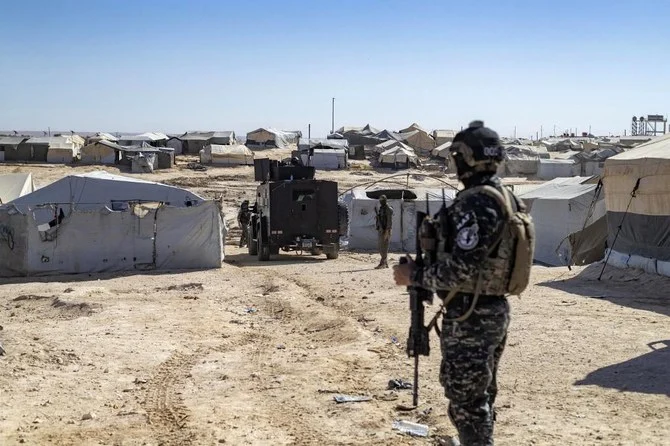
- ARAB NEWS
- 14 Jul 2025

BEIRUT: Kurdish forces in northeast Syria on Saturday announced the end of a three-week operation against Daesh group supporters inside the overcrowded and increasingly lawless camp of Al-Hol.
They arrested more than 200 people, including dozens of women, discovered tunnels used by extremists and seized an arsenal of weapons.
The internal security forces of the area’s semi-autonomous Kurdish administration carried out the massive sweep of the camp, which houses tens of thousands of relatives of suspected Daesh members.
The number of murders inside the camp had risen recently, as had fears that Al-Hol was becoming the hub from which the extremist organization was planning its resurgence.
“The operation was launched following the increasing crimes of killing and torture committed by Daesh,” a Kurdish statement said.
The UN says more than 100 people have been murdered since the start of 2021 in Al-Hol, which lies in a remote area near the border with Iraq and is home to Syrian and Iraqi families, as well as around 10,000 of others, mostly women and children, originating from further afield.
The Kurdish security forces said Daesh had relied heavily on women and children in Al-Hol, most of whom had been there for more than three years, to spread the group’s extremist ideology.
The last rump of the organization’s once-sprawling “caliphate” was retaken in March 2019, causing an exodus among the proto-state’s last denizens.
The families of suspected Daesh fighters were herded into Al-Hol, a de facto detention camp which Kurdish forces are tasked with guarding and running.
Many countries, such as France which was among the biggest purveyors of foreign fighters to Daesh, have been reluctant to repatriate their citizens.
Kurdish forces said they made a total of 226 arrests, uncovered 25 “tunnels and trenches,” confiscated assault rifles, a rocket-propelled grenade and 25 hand grenades.
The internal security forces also said they freed two women from Iraq’s Yazidi minority who were being held by female Daesh sympathizers inside the camp, as well as four other women who were found chained.
Among the other discoveries were many communication devices used to coordinate with Daesh cells outside Al-Hol, organize money transfers and plan attacks, the statement said.
The Kurdish authorities reiterated their call on foreign countries to repatriate their nationals, arguing the world had “underestimated the seriousness of the threats in the camp.”
“We also call on the relevant international parties to note the organic relationship between the Turkish intelligence services and Daesh cells,” it said.
The internal security forces, also known as Asayish, charged that one of the many NGOs active inside Al-Hol, the Turkey-based Bahar, was complicit in funnelling weapons and money into the camp.
AFP